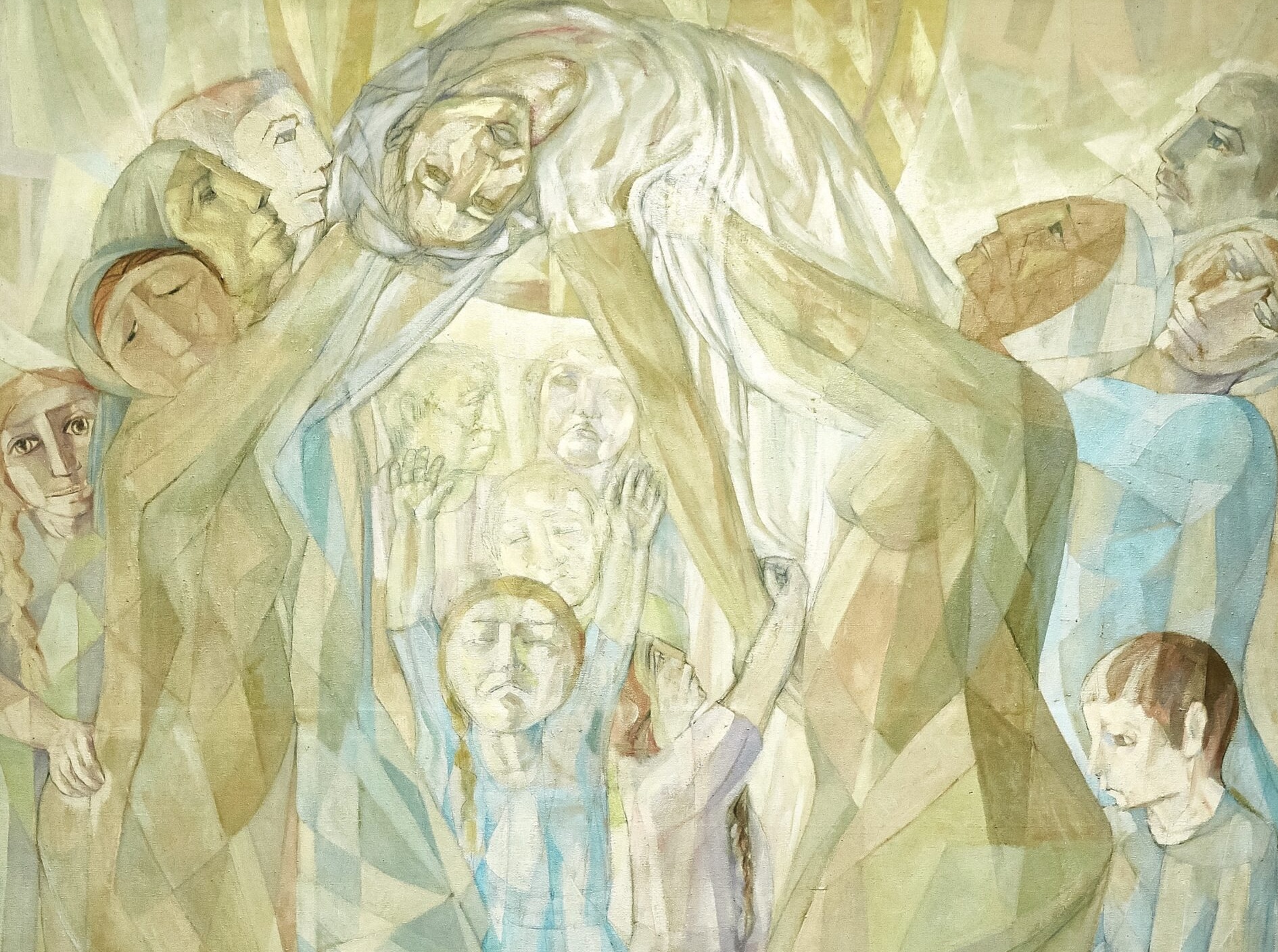Aftermaths of War
“Challenging a narrative often implied as an exclusively masculine performance of national sacrifice, Leila Nseir’s The Marytr (The Nation) depicts the martyrdom of a woman, and displays the mourning of her death. Pushing back against the distinctly male image of the fedayi freedom fighter that has typically dominated the iconography of liberationist struggle in the Arab world, the subject is held up by her grieving female companions, as crying children reach up to touch her. Likely a product of Nseir’s visit to south Lebanon 1976, the work places a somber spotlight on the female plight in war.” ― Barjeel Art Foundation
 Image Credit: Leila, Nseir. (1978). The Martyr (The Nation). [Oil on canvas 160 x 140 cm]. Barjeel Art Foundation, Sharjah.
Image Credit: Leila, Nseir. (1978). The Martyr (The Nation). [Oil on canvas 160 x 140 cm]. Barjeel Art Foundation, Sharjah.
Dates:
Tuesday, November 12, 2024 | 1:30 pm – 5:30 pm | Express Newark, 54 Halsey St. Newark, NJ 07102 | Download Program
Wednesday, November 13, 2024 1:00 – 7:00 pm | Ruth Bader Ginsburg Hall, 15 Washington Street, Newark, NJ 07102 | Download Program
Event Details: How can histories of violence be narrated? How can these stories produce more critical, complex, and nuanced pictures that attend not simply to the individual experience of victimization, but might also shed light on experiences of agency? From examining the role of historical thinking and writing in wartime and postwar contexts, and examining the place of literature and art in commemorations of war and conflict, to grappling with the ethical implications of the stewardship of objects that bear witness to histories of extraction and exploitation, this seminar will explore the ways that narrative and storytelling practices have the potential to mediate both violent pasts and the present in ways that may offer reparative tools for the future. This event was made possible by the Mellon Foundation Sawyer Seminars. Many thanks to our co-sponsors for their additional support and contributions. Much gratitude to Gourmet Dining, Reservations, and Express Newark!
Cost: Free and open to the public.
Accommodations: Please submit accommodation requests to sawyerseminar@newark.rutgers.edu by Friday, November 8, 2024.
Click here to view recorded livestream!
Tuesday, November 12, 2024:
1:30 – 2:30 PM: Lunch and Learn with Introductory Remarks
Mayte Green Mercado, Associate Professor of History, and the Newark Campus Director of the Institute for the Study of Global Racial Justice
Amir Moosavi, Assistant Professor in the Department of English at Rutgers University – Newark, and Co-Organizer
Wendell Marsh, Assistant Professor of Africana Studies at Rutgers University – Newark and Co-Organizer
Screening of Newest Americans Historias para lo que viene
2:30 – 3:50 PM: Methodology Teach-In
Dr. Catalina Muñoz, Associate Professor of History, Universidad de los Andes, Colombia
3:50 – 4:00 PM: Coffee and Tea Break
4:00 – 5:30 PM: Keynote Conversation: Histories for the Future: Critical Conversations on Reparative Practices
Dr. Catalina Muñoz, Associate Professor of History, Universidad de los Andes, Colombia
Gary Wilder, Professor of Anthropology and director of the Committee on Globalization and Social Change,
Liz Ševčenko, Director, Humanities Action Lab, Rutgers Newark, Moderator
Wednesday, November 13, 2024:
1:00 – 2:20 PM: Lunch and Learn with Short Film Screening
Short film screening of Something Dead in Every Landscape and conversation with Abdalla Bayyari, Roula Seghaier, Moderator
2:20 – 2:30 PM: Break
2:30 – 3:50 PM: Panel Writing in Times of War
A conversation with novelists Fatin Abbas (Sudan), Ibtisam Azem (Palestine), and Sinan Antoon (Iraq)
3:50 – 4:00 PM: Coffee and Tea Break
4:00 – 5:30 PM: Hybrid Roundtable: Institutions of Repair
Deirdre de la Cruz, University of Michigan, Director of ReConnect/ReCollect
Wafa Ghnaim, Senior Interdisciplinary Research Fellow for The Metropolitan Museum of Art in the Department of Ancient Near Eastern Art
Abdourahmane Seck, University Gaston Berger, Senegal and co-founder of the Groupe d’Action et d’étude critiques
Wendell Marsh, Assistant Professor of Africana Studies at Rutgers University – Newark, Moderator
5:30 – 6:00 PM: Coffee and Tea Break
6:00 – 7:00 PM: Performance featuring the This Time’s Quartet at Clement’s Place